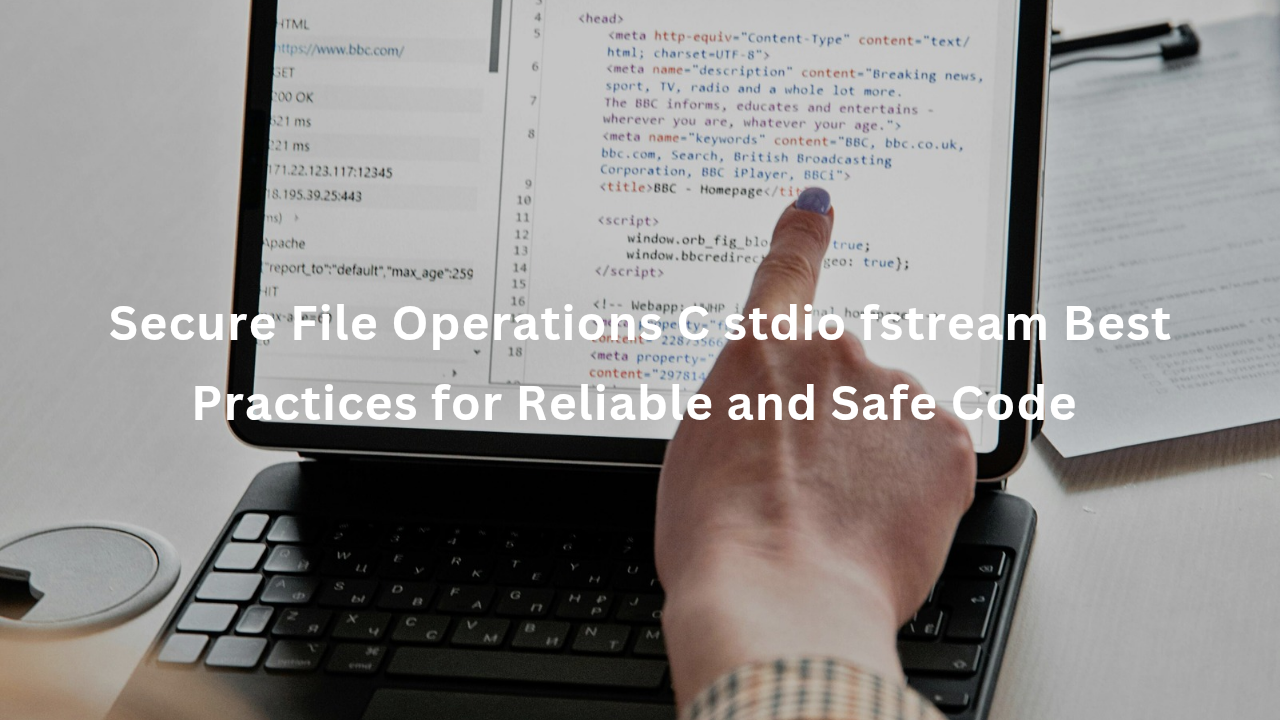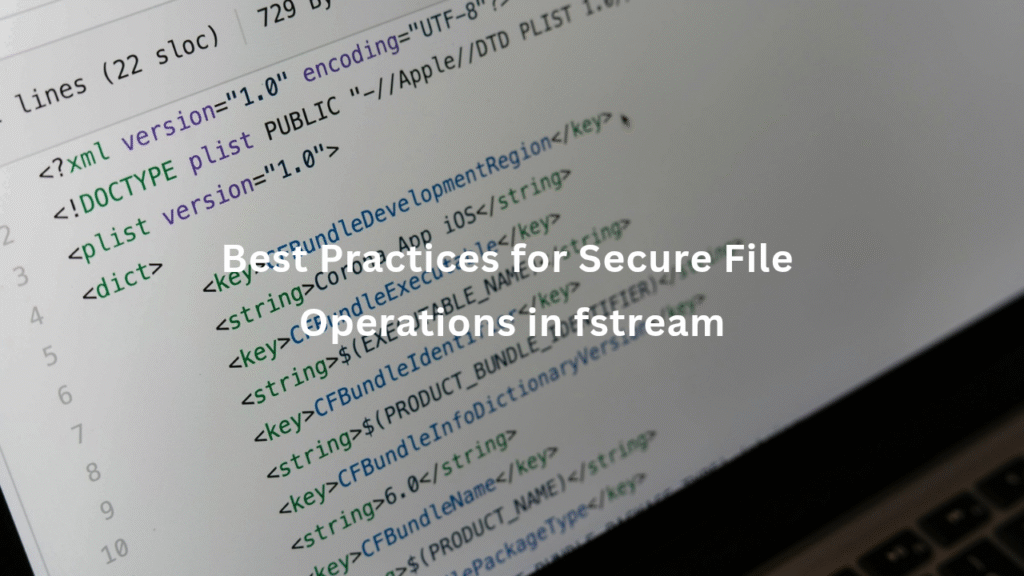
Working with files in C is deceptively simple. You call fopen(), read or write, then close it. Easy, right? That’s what we thought too until we ran into corrupted logs, security reports pointing out race conditions, and unexplained crashes in production.
Over time, we’ve learned that secure file operations in C, especially using stdio and fstream, require more than just syntax familiarity. They demand discipline, awareness of risks, and consistent best practices.
This article outlines the secure file operations C stdio fstream best practices we’ve adopted, hard-earned from real-world development experience and explains how you can write reliable and safe code.
Key Takeaway
- Always validate file access, handle errors at every step, and sanitize all file names and paths.
- Maintain control of file permissions and use temporary files for updates to prevent loss and attacks.
- Close files immediately after use and document all failures to track and prevent silent data corruption.
Why Secure File Handling Matters
Whether you’re handling configuration files, logs, or binary data, insecure file operations can introduce:
- Crashes from unhandled errors
- Data leaks due to permissive file access
- Corruption due to unsynchronized access
- Vulnerabilities like directory traversal
In one project, a missing permission check allowed an attacker to overwrite a config file just by exploiting the filename parameter. We were lucky it wasn’t worse.
Understanding C File Handling: Stdio and Fstream
C’s standard I/O (stdio) gives you functions like fopen, fread, fwrite, and fclose. They’re fast and familiar:
c
FILE *fp = fopen(“data.txt”, “r”);
if (fp == NULL) { /* handle error */ }
fgets(buffer, size, fp);
fclose(fp);
Stdio is flexible but doesn’t stop you from making risky mistakes. Fstream in C++ adds some abstraction:
cpp
std::fstream file(“data.txt”, std::ios::in | std::ios::out);
if (!file.is_open()) { /* handle error */ }
std::getline(file, line);
file.close();
Fstream helps with resource management, but you still need to handle exceptions and close files. Both methods demand careful handling to stay secure.
Best Practices for Secure File Operations in stdio
Credit by Caleb Curry
Check Return Values Rigorously
c
FILE *fp = fopen(“file.txt”, “r”);
if (!fp) {
perror(“Failed to open file”);
return;
}
Never assume a file operation succeeded. We once lost hours debugging a NULL dereference caused by a silent fopen failure.
Use the Right File Modes
Always specify the correct mode. Use “a” to append, “r+” for read/write without truncation. Be cautious with “w” as it truncates files.
Apply Restrictive File Permissions
Ensure files aren’t world-readable or writable. When creating files:
c
umask(0077); // Restrict permissions
This simple practice saved us from accidentally exposing private keys during internal testing.
Limit Buffer Size
c
char buffer[256];
fgets(buffer, sizeof(buffer), fp);
Avoid using gets() or fscanf() with %s, which can cause buffer overflows.
Always Close Files
c
fclose(fp);
Missing fclose leads to file descriptor leaks. We’ve hit system limits in long-running daemons because of this.
Validate and Sanitize File Names
If file paths come from users, sanitize them to avoid directory traversal:
c
if (strstr(filename, “..”)) {
fprintf(stderr, “Invalid path\n”);
return;
}
Best Practices for Secure File Operations in fstream

Always Check is_open()
cpp
std::ifstream file(“data.txt”);
if (!file.is_open()) {
std::cerr << “Cannot open file\n”;
}
This check avoids undefined behavior. We’ve had logic failures silently occur because the file failed to open and we didn’t notice.
Use Specific Open Modes
cpp
std::ofstream file(“log.txt”, std::ios::app);
Being explicit prevents platform-specific defaults from behaving unexpectedly. (1)
RAII and Scope Management
Let the destructor manage file closing:
cpp
{
std::ofstream out(“data.txt”);
out << “Hello\n”;
} // File auto-closed
This helps prevent leaks and makes your code cleaner.
Use getline() with std::string
Avoid unbounded input:
cpp
std::string line;
std::getline(file, line);
Safer than file >> variable, which stops at whitespace and may truncate data.
Avoid Concurrent Read-Write without Sync
cpp
std::fstream file(“data.txt”, std::ios::in | std::ios::out);
file.seekg(0);
file.seekp(0);
Mixing reads and writes without repositioning caused us to accidentally skip writing logs. (2)
Handle Exceptions Safely
cpp
try {
std::ifstream file(“input.txt”);
if (!file) throw std::runtime_error(“Open failed”);
} catch (const std::exception& e) {
std::cerr << e.what();
}
Useful when working with exception-enabled streams.
Our Hard Lessons: What We Learned From Mistakes
One semester, we lost a full week’s logs to a wildcard gone wrong. Another time, a user uploaded a file with the name /etc/shadow, and trusting their input nearly cost us the server.
Our worst bug? Not checking fwrite’s return value led to silent, partial data loss that went unnoticed for weeks.
We fixed these by:
- Strictly validating all file names.
- Keeping all user files in a dedicated, locked-down directory.
- Logging every file operation, failure and success.
We also keep regular backups. Nothing fancy, just zip files and timestamped copies. It’s boring, but it’s saved us more than once.
Shared Security Tips for Both C and C++
Avoid Temporary Files in Shared Directories
Creating temporary files in directories like /tmp or the Windows temp folder without proper precautions can lead to TOCTOU (Time of Check to Time of Use) vulnerabilities.
What to do:
- Generate unique, unpredictable filenames.
- Use secure temp directories with limited access.
- In C, consider using mkstemp() instead of tmpfile() or manual filename generation.
- In C++, avoid writing to shared locations unless absolutely necessary.
Our experience:
One internal tool used a predictable temp filename in /tmp, an attacker replaced the file with a symlink to /etc/passwd. Luckily, we caught it during an internal security review.
Validate File Size Before Reading
Blindly reading files without checking their size is risky, especially if they’re user-controlled. This can cause:
- Buffer overflows
- Out-of-memory crashes
- Long delays from unexpectedly large files
What to do:
- Use fseek() and ftell() in C to determine file length.
- In C++, use seekg and tellg with ifstream.
c
fseek(fp, 0, SEEK_END);
long size = ftell(fp);
rewind(fp);
Our experience:
A client-side component crashed on a 300MB input file when we expected just a few kilobytes. Simple file size checks would have prevented this.
Use File Locks When Accessing Shared Files
In multi-threaded or multi-process environments, concurrent file access is one of the most dangerous and easily overlooked sources of bugs and data corruption.
When two entities try to read from or write to the same file at the same time without coordination, you invite chaos:
- Incomplete writes
- Overlapping logs
- Truncated or malformed data
- Race conditions
- Lost updates
Real-World Failure We Encountered
We had a telemetry logger that continuously wrote diagnostic data to a log file every second. At the same time, a scheduled report generator would parse the same file every 30 minutes to generate summaries.
For weeks, we noticed some reports were malformed, missing half the entries, or containing corrupted lines.
After an investigation, we realized both processes were accessing the file simultaneously without locking, leading to partial reads and inconsistent state.
The fix? Simple advisory file locking and the problem was gone.
How File Locks Work
There are two main types of file locks:
- Advisory locks Cooperative processes must respect the lock voluntarily. Used in most Unix systems.
- Mandatory locks Enforced by the OS, less common and tricky to configure.
For most applications, advisory locks are the recommended approach due to better portability and fewer side effects.
Avoid Hardcoded File Paths in Code
Hardcoded file paths are one of those things that feel convenient during development—but can quickly become a maintenance nightmare and a security risk in production.
Why It’s a ProblemL:
Lack of Flexibility
When a path is hardcoded like this:
c
FILE *fp = fopen(“/home/dev/data/input.txt”, “r”);
The program is tightly bound to that directory structure. Move the program to another system, and it breaks. Change the user’s environment, and it fails. Deploy it on Windows instead of Linux? Forget it.
Exposure of Sensitive Locations
Hardcoded paths may unintentionally reveal:
- Internal directory structures
- Usernames (e.g., /home/username/secret.log)
- Critical system files (e.g., /etc/passwd, C:\\Windows\\System32)
This not only violates best practices, but also gives attackers useful clues.
Security Misconfiguration
If paths point to publicly writable locations or sensitive files, it’s easy to introduce vulnerabilities. For example, a hardcoded path to /tmp/appdata could allow any user on the system to inject or replace data.
Real-World Failure
We once shipped a tool that tried to write logs to /var/tmp/mylog.txt. On the dev machine, everything worked fine. But in production, that path didn’t exist and worse, the process had no write permission there. It failed silently and debugging took hours.
Conclusion
Security doesn’t stop at the network layer. It’s in every fopen, every fclose, every fstream object. By following secure file operations C stdio fstream best practices, you’re not just protecting data you’re protecting your time, your users, and your reputation.
Use the tools responsibly. Review often. And always write as if someone malicious is watching your code because one day, they might.
Ready to go deeper into secure coding? Join the Secure Coding Bootcamp and sharpen your skills with hands-on training.
FAQ
What’s more secure stdio or fstream?
Neither is inherently more secure. Security comes from usage patterns. fstream benefits from RAII and type safety.
Should I always use binary mode?
Not necessarily. Use binary mode (“rb”, std::ios::binary) when handling non-text data to avoid corruption on different OSes.
Can I rely on exceptions with fstream?
Yes, but ensure exception flags are set, and handle exceptions properly to avoid silent failures.
Why is path validation important?
Unchecked paths can lead to directory traversal, exposing sensitive files or allowing unintended overwrites.
How do I avoid file descriptor leaks?
Always close files, and prefer automatic mechanisms (e.g., RAII in C++). Monitor usage with tools like lsof or /proc.
Reference
- https://www.udacity.com/blog/2021/05/how-to-read-from-a-file-in-cpp.html
- https://medium.com/@ryan_forrester_/c-file-handling-with-fstream-a-complete-guide-a4ebcc294bd0

